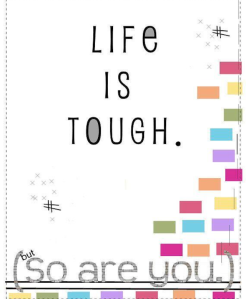“For a while she considered being ill, but she changed her mind.” – Tove Jansson
There is an expectation in the world of care-providers to never label someone by leading with their diagnosis. For example, you should never say “the autistic kid” but rather, “the child with autism.” We would never say my cancer friend or my Alzheimer’s grandparent. Out of respect for the person, we are taught to name the disability after, as to not make the illness own the patient. The term we use is person-first language.
So why then, if our medical providers (attempt to) treat us with respect, do we (as patients) so often label our own illnesses or disabilities ahead of ourselves? Why do we classify ourselves in terms of the diagnoses that so often bring us down?
I found this picture in a series of tumblr posts with various diagnosis and the bottom line always says “and that’s who I am.” It’s not uncommon that I find these kinds of words on social media – people talking about themselves in terms of their illness.
There is a school of thought that using this helps a person “own” their diagnosis and come to accept it. What a hard, long process it is to accept a life-altering medical condition. At the same time, my question is, how then does a person determine who they are outside of their illness?
One of my concerns with labeling ourselves in this way is how it changes the perception of those around us and our interactions with friends and loved ones. Although it may provide an excuse or an “out” in situations when we aren’t feeling up for something, it may also discourage future invitations and social interactions. In making the disease control ourselves, feelings of pity and separation may transpire in those closest to us. This can backfire and as the world begins to pity us, we too fall into a cycle of feeling sorry for ourselves and frustrated with the things we cannot do.
Personally, I struggle with naming my illness before myself. The path of learning to embrace illness, is a long and winding one, with ups-and-downs a plenty. I can appreciate how surrounding oneself with people experiencing similar challenges and exploring ideas for treatment is therapeutic and informative. This is so important: I even wrote about it here. At the same time, I think walking a line of “patient with a condition” and “person with strengths outside of that condition” is an important one to traverse and it takes such careful navigation. Through the journey, I’ve stepped quite heavily on either side and to be honest, I’m not sure I would have had it anyway: it’s an important part of acceptance. Heck, that side to side dance is an ongoing process that will probably never end. But over-identifying with a condition, or allowing it to dominate over my whole being frightens me, quite frankly.
This is not to say I ignore my symptoms, stop taking medicine, or discontinue proactive health activities. However, it does mean defining myself outside of the illness: recognizing that I am so much more than my disease and I have something beautiful to offer the world. I am more than my symptoms and my symptoms cannot – and will not – define me.
I am beautiful. Strong. A fighter. Creative. Intelligent. Mature. A believer. Brave. Determined. and Tough-skinned. With an empathetic tender-hearted center.
So please, take a mental note, when talking about your illness by saying “that’s who I am:” and consider your purpose behind using that label. Because personally, I don’t think it is who you are. You are something so much more; you have something great to offer. The rest of the world sees it, and so should you.
Thoughts? Opinions? I know there are differing schools of thought and I would love to hear other perspectives.



So true. It’s so easy to get so caught up in illness that you lose sight of who you are (despite it not because of it).
LikeLike
Definitely! Thank you for your comment.
LikeLike